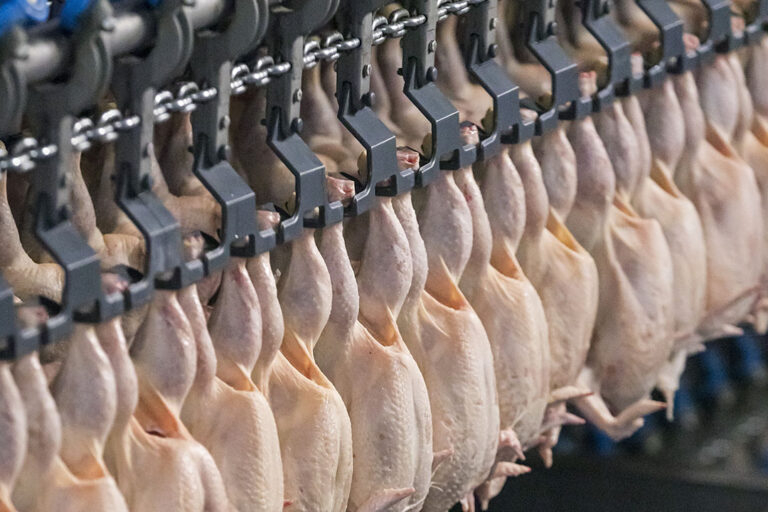June 4, 2025 | 08:22 GMT +7
June 4, 2025 | 08:22 GMT +7
Hotline: 0913.378.918
June 4, 2025 | 08:22 GMT +7
Hotline: 0913.378.918

Research institutions in the US are developing artificial intelligence and robotics specifically for the processing sector. Photo: Koos Groenewold
Backed by a 4-year US$5 million grant from the US Department of Agriculture’s National Institute of Food and Agriculture, the research organisations helped establish the Centre for Scalable and Intelligent Automation in Poultry Processing.
The collaborative effort by the University of Arkansas, Georgia Institute of Technology, University of Nebraska-Lincoln, and Fort State Valley University will ensure the merging of artificial intelligence, machine learning and robotics to advance chicken meat processing operations and sanitation.
Poultry processing line workers
Project director, Jeyam Subbiah, said the Arkansas Agricultural Experiment Station would receive nearly half of the grant (US$2.2 million) to focus on food safety automation for poultry processing plants. The impetus to automate chicken processing began with the Covid-19 pandemic when illness spread quickly among processing line workers. Since then, it’s been very difficult to hire enough workers.
“Poultry processing lines began 70-80 years ago. Since then, there have been only incremental changes in technology. Today, there is a need for transformative change,” said Subbiah.
Improve precision and reduce wastage
Subbiah said robotic hands were not adept at holding a chicken and that new technology was needed to prevent dropping slippery meats. Separating the carcases into cuts of meat was also tricky: “It’s hard enough to teach people how to use a knife with precision,” added Donyi Wang, assistant professor of biological and agricultural engineering for the Arkansas Agricultural Experiment Station.
“Robotics are fit for repetitive tasks but don’t do well with the precision needed to cut chicken products,” he added, saying that existing automation in poultry processing, like deboners, wastes a lot of meat.
“Human deboners leave about 13% of meat on the bones. Automated deboners leave 16-17%. On an industrial scale, that’s a significant loss in value. We will use artificial intelligence and virtual reality to improve precision and reduce wastage.”
Wang and Subbiah will also develop hyperspectral imaging to detect plastics in chicken meat. Wang will also develop a mobile robot that is equipped with a biosensor to produce a biological map of the facility to evaluate the efficiency of sanitation. The robot will automatically collect swabs to test for bacteria when the bio map indicates potential hot spots.
Funding
The Georgia Institution of Technology will receive US$2.1 million of the grant to focus on automating the processing lines that turn chickens into meat.
Doug Britton, manager of the Agricultural Technology Research Programme, said: “The ultimate goal is to drive transformational innovation into the poultry and meat processing industry through automation, robots, artificial intelligence and virtual reality technology.”
The remaining financial support has gone to the University of Nebraska-Lincoln, where Julia McQuillan, professor of sociology will study the effects of robotics on poultry industry labourers and how they perceive the technology.
“We hope to eventually bring new owner-operated businesses to rural areas. Collaborating with food scientists, computer scientists, extension faculty, and robotics engineers provides amazing opportunities to understand the meanings of innovations for entrepreneurs, workers and other stakeholders and to advance fundamental theories about science, technology and society in sociology.”
Finally, Brou Kouakou, associated dean for research at Fort Valley State University in Georgia, will investigate the application of technology developed through the project to see if it can be used for other meat industries.
(PW)

(VAN) Vikas Rambal has quietly built a $5 billion business empire in manufacturing, property and solar, and catapulted onto the Rich List.

(VAN) Available cropland now at less than five percent, according to latest geospatial assessment from FAO and UNOSAT.

(VAN) Alt Carbon has raised $12 million in a seed round as it plans to scale its carbon dioxide removal work in the South Asian nation.

(VAN) Attempts to bring down the price of the Japanese staple have had little effect amid a cost-of-living crisis.

(VAN) Fourth most important food crop in peril as Latin America and Caribbean suffer from slow-onset climate disaster.

(VAN) Shifting market dynamics and the noise around new legislation has propelled Trouw Nutrition’s research around early life nutrition in poultry. Today, it continues to be a key area of research.

(VAN) India is concerned about its food security and the livelihoods of its farmers if more US food imports are allowed.